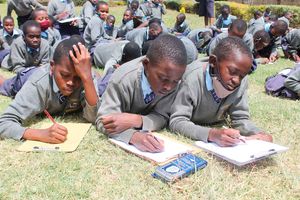
In recent years, the prestige and value of having a basketful of degrees has diminished.
One of the most important stories out of Kenya in recent days was quite unremarkable. It was not about the nearly Byzantine “Mount Kenya supremacy battles” or one promising dramatic revelations about the ruling party “UDA turmoil” (an outsider needs to have undergone a long rite of passage to get the full import of the stories). It came via an otherwise bland headline in Tuesday’s Daily Nation: “Students shun degree courses in diploma placements”.
The story said that 47,872 students who qualified for university admission in the Kenya Certificate of Secondary Education (KCSE) did not choose to study for a degree course. Instead, they elected to study for diplomas and other certificate courses. Meanwhile, Kenya’s “public and private universities remain under-enrolled for the various programmes they offer”.
What do those 47,872 students know that the rest of us wiseacres don’t? For one, they are correctly reading the shape of a world driven by artificial intelligence (AI). Some have seen it coming for some years now.
It is said that if an African nation strikes oil, the smart fellows wanting to make money in niche markets run in the opposite direction and invest in green enterprises—eco-tourism, a hotel with beautiful gardens, recycling and such things.
Disruptive AI season
The idea is that, before long, the oil will have spilt and polluted vast expanses of land so much, and the petrodollars will have been used to build unsightly skyscrapers and concrete jungles in the cities, people will be driven crazy by all the ugliness and seek to escape into environmental pleasing alternatives—the Karura Forests and Dubai Miracles Gardens of this world.
Likewise, in a hyper-digital era and the onset of what is going to be a long and disruptive AI season, many lucrative opportunities open up in the opposite (wo)man-made hands-on creative spaces. Once you have spent a day speaking to an Alexa virtual assistant in your home, your greatest desire cannot be to go out to a restaurant to order dinner through a robot. You are most likely to go to a rowdy nyama choma joint and order your goat happily from a rude waitress. It is the reason people with big curved television screens in their homes go to a noisy seedy pub to watch Premier League football.
In recent years, the prestige and value of having a basketful of degrees like former Zimbabwe strongman Robert Mugabe has diminished. When I was young, if you studied Pure Maths, you were considered to have superpowers. Lesser mortals would give way if you were approaching. Many parents would be delighted if you proposed to marry their daughter.
Calculator
Then along came a humble device called the calculator and the party ended. In the past 20 years, I haven’t met any parent who has boasted to me about their son- or daughter-in-law being an accomplished mathematician.
In these high-technology times, the humble things are returning. Thus, in the past few years, around the world, women—and men—have rediscovered hand-knitting. There is a whole relatively new shop in Village Market dedicated to knitting things. I get many requests from people outside Kenya to buy and send them stuff. They usually send Instagram and Facebook of the products they want—intricately handmade bags, beaded watches, outlandish kimonos, decorated plates, Goth-inspired picture frames, illustrated books...the list is long.
One time, I was asked to go and check out an ingenious composting latrine, and a cement “dishwasher” and dryer. I didn’t. It was far, somewhere in western Kenya, but I did find the contact of their creator.
Warm human creations
Virtually all the makers are young Kenyans. They understand that warm human creations will be much sought after the more AI makes things and takes over several manual functions.
The work of people who know a lot of maths, are masters of world history and got First Class degrees will become even more important. But they will no longer be the face of it. The code or algorithm the maths geniuses write will be the king, and they will be paid a lot of money, but be doomed to live in relative obscurity.
On X, you type a query on 20th Century world history in the AI tool Grok and you get your crisp answer in less than two seconds. The great historian’s work will show up as just one of many links from which it coped its answer. If people can get twice the sum of your knowledge summarised in a few seconds, it is only a matter of time before they stop standing up when you enter the room because you are a professor, PhD, DPhil, DSoc, MA, MScRes and a Fellow of the College of Fulani.
But there will be the few men and women of great learning and titles who will become Mona Lisas and hang on our walls and galleries, or have their holograms beamed at exhibitions. The people will go and fix admiring gazes on them as they knit their sweaters.
Mr Onyango-Obbo is a journalist, writer, and curator of the “Wall of Great Africans”. @cobbo3










